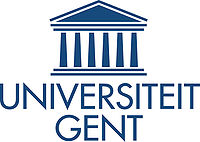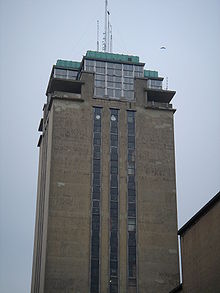| Ghent University |
| Universiteit Gent (Dutch) |
 |
| 拉丁语: Academia Gandavensis |
| 校训 |
Inter Utrumque |
| 英语校训 |
In Between (Both Extremes) |
| 建立于 |
1817 |
| 类型 |
Public |
| Religious affiliation |
Pluralistic |
| 捐赠 |
€ 410 million |
| Rector |
Paul Van Cauwenberge |
| 工作人员 |
7,100 |
| 学生 |
32,000 |
| 位置 |
Ghent, Flanders, Belgium
51°2′46″N 3°43′39″E / 51.04611°N 3.7275°E / 51.04611; 3.7275Coordinates: 51°2′46″N 3°43′39″E / 51.04611°N 3.7275°E / 51.04611; 3.7275 |
| 曾用名 |
State University of Ghent (RUG) |
| Colours |
Blue and Yellow |
| 归属 |
Ghent University Association
Santander Network
Erasmus Student Network
European University Association |
| 网址 |
http://www.ugent.be |
Ghent University (Dutch: Universiteit Gent, abbreviated as UGent) is a Dutch-speaking public university located in Gent, Belgium. It is one of the larger Flemish universities, consisting of 32,000 students and 7,100 staff members. The current rector is Paul Van Cauwenberge.
It was estabilished in 1817 by King William I of the Netherlands. After the Belgian revolution of 1830, it was administered by the newly-formed Belgian state. French became the acadamic language until 1930, when Ghent University became the first Dutch-speaking university in Belgium. In 1991, the university was granted major autonomy and changed its name from State University of Ghent (Dutch: Rijksuniversiteit Gent , abbreviated as RUG) to its current name.
历史
The university in Ghent was opened on 9 October 1817, with JC van Rotterdam serving as the first rector. In the first year, it had 190 students and 16 professors. The original four faculties consisted of Humanities (Letters), Law, Medicine and Science, and the language of instruction was 拉丁语. The university was founded by King William I as part of a policy to stem the intellectual and academic lag in the southern part of the United Kingdom of the Netherlands, later to become Belgium. The universities in Leuven and Liège were founded as part of the same movement.
After peaking at a student population of 414, the number of students declined quickly following the Belgian Revolution. At this time, the faculties of Humanities and Science were broken off of the university, but they were restored five years later, in 1835.
In 1882, Sidonie Verhelst became the first female student at the university.
French became the language of instruction, taking the place of Latin, after the 1830 Revolution. In 1903, the Flemish politician Lodewijk De Raet led a successful campaign to begin instruction in Dutch, and the first courses were begun in 1906. A Flemish Institute (Vlaemsche Hoogeschool) was founded in 1916 but was disestablished due to the ongoing First World War. Cabinet Minister Pierre Nolf put forward a motion in 1923 to fully establish the university as a Dutch-speaking university, and this was realized in 1930. August Vermeylen served as the first rector of the first exclusively Dutch-language university in Belgium.
In the Second World War, the German administration of the university attempted to create a German orientation, removing faculty members and installing loyal activists. However, the university became the focal point for many resistance members as the war progressed.
After the war, the university became a much larger institution, following government policy of democratizing higher education in Flanders during the 1950s and 1960s. By 1953, there were more than 3000 students, and by 1969 more than 11,500. The number of faculties increased to eleven, starting with Applied Sciences in 1957. It was followed by Economics and Veterinary Medicine in 1968, Psychology and Pedagogy, as well as Bioengineering, in 1969, and Pharmaceutical Sciences. The faculty of Politics and Social Sciences is the most recent addition, in 1992.
The university officially changed its name from Rijksuniversiteit Gent (RUG) to Universiteit Gent (UGent) in 1991 following an increased grant of autonomy by the government of the Flemish Community.
On 22 March 2005, Paul Van Cauwenberge succeeded Andreas De Leenheer as rector.
Faculties
Ghent University consists of eleven faculties, composed of more than 130 departments:
- Faculty of Arts and Philosophy
- Faculty of Law
- Faculty of Sciences
- Faculty of Medicine and Health Sciences
- Faculty of Engineering
- Faculty of Economics and Business Administration
- Faculty of Veterinary Medicine
- Faculty of Psychology and Educational Sciences
- Faculty of Bioscience Engineering
- Faculty of Pharmaceutical Sciences
- Faculty of Political and Social Sciences
Characteristics
In contrast to the Catholic University of Leuven, or the Freethinking Vrije Universiteit Brussel, Ghent University considers itself a pluralist university in a special sense (i.e. not connected to any particular religion or ideology, hence its motto Inter Utrumque or 'In Between Both Extremes').
International acclaim
In the 2009 THE–QS World University Rankings list of the top 200 universities in the world, Ghent University is ranked in 136th place. An overview of the last years:
| Year |
Rank (Change) |
| 2005 |
218 |
| 2006 |
141 (▲ 77) |
| 2007 |
124 (▲ 20) |
| 2008 |
136 (▼ 12) |
| 2009 |
136 (▬) |
Ghent was also placed among top 95 universities in the world according to the Russian based Global University Ranking.
Notable alumni

The Boekentoren, designed by Henry van de Velde, is one of the most famous university buildings
- Leo Apostel (1925-1995), philosopher
- Leo Baekeland (1863-1944), chemist
- Wim Blockmans (1945-), historian
- Thierry Bogaert, founder of DevGen
- Luc Bossyns, civil engineer
- Marc Bossuyt (1944-), judge, professor
- Jo Bury, pharmacology, General Director of the VIB
- Dries Buytaert (1978-), computer scientist, founder of the Drupal CMS
- Robert Cailliau (1947-), co-inventor of the World Wide Web
- Luc Coene, economy, Vice-Governor of the National Bank of Belgium (NBB).
- Marc Coucke (1965-), co-founder of Omega Pharma
- Martin De Prycker (1955-), engineer.
- Franz Cumont (1868-1947), historian
- Jean Daskalidès, (1922-1992), gynecologist, founder of Leonidas chocolates
- Els De Bens, philologist, media specialist
- Bert De Graeve, law, businessman
- Rudy Dekeyser, molecular biologist, Assistant Director of the VIB
- Jozef De Ley, the founder of the Laboratory of Microbiology at the Faculty of Sciences
- Wim De Waele, economy and computer science, Director of the IBBT
- Martin Dobelle, veteran orthopedic sergeon
- Paul Fredericq, historian
- Walter Fiers (1931-), molecular biologist
- Leopold Flam (1912-1995), historian, philosopher
- Dirk Frimout (1941-), physicist, astronaut
- Derrick Gosselin (1956-), engineer, economist, business manager
- Joseph Guislain (1797-1860), physiologist and psychiatrist
- Jacques-Joseph Haus (1796-1881), jurist
- Lucienne Herman-Michielsens, (1926-1995) , law, politician
- Philippe Herreweghe (1947-), doctor, psychiatrist, orchestra conductor
- Corneille Heymans (1892-1968), physiologist (Nobel prize winner)
- Mark Janse (1959- ), classicist & linguist
- Friedrich August Kekule von Stradonitz (1829-1896), chemist
- Jaap Kruithof, philosopher
- Tom Lanoye (1958-), philologist, writer
- François Laurent (1810-1887), jurist
- Marguerite Legot (1913-1977), jurist, first Belgian woman to serve as a government minister
- Yves Leterme (1960-), Prime Minister of Belgium
- Herman Liebaers (1919-), writer, former Marschal of the Royal Household.
- Suzanne Lilar (born Suzanne Verbist) (1901-1992), philosopher, jurist, essayist, novelist
- Julius Mac Leod (1857-1919), botanist
- Maurice Maeterlinck (1862-1949), jurist, writer (Nobel prize winner)
- Paul Mansion, mathematician
- Rudi Mariën, pharmacy, Chairman of Innogenetics
- Gerard Mortier (1943-), artistic director
- Jean-Pierre Nuel (1847-1920), physiologist
- Peter Piot (1949-), doctor, assistant secretary-general of the United Nations
- Henri Pirenne (1862-1935), historian
- Karel Poma (1920-), chemist and politician
- Adolphe Quetelet (1796-1874), statistician
- Godfried-Willem Raes (1952-), composer, performer and instrument maker
- Jacques Rogge (1942-), doctor, president of the International Olympic Committee
- Gustave Rolin-Jaequemyns (1835-1902), jurist, diplomat and cofounder of the Institut de droit international
- Jozef Schell (1935-2003), molecular biologist
- Ferdinand Augustijn Snellaert, (1809-1872), physician and writer
- Luc Van den Bossche (1947-), law, politician
- Guido van Gheluwe (1926-), jurist and founder of the Orde van den Prince
- Herman Vanderpoorten, (1922-1984), politician
- Hugo Van Heuverswyn (1948-) chemist, biotech pioneer and businessman
- Ann Van Gysel, zoology
- Karel van de Woestijne, (1878-1929), writer
- Prudens van Duyse, (1804-1859), writer
- Henry van de Velde (1863-1957), architect
- Marc Van Montagu (1933-), biotech pioneer
- Désiré van Monckhoven (1934-1882), physicist
- Jules Van Praet (1806-1887), statesman
- Piet Vanthemsche, veterinary surgeon
- Guy Verhofstadt (1953-), former Prime Minister of Belgium
- Etienne Vermeersch (1934-), philosopher
- Kristiaan Versluys, literary scholar
- André Vlerick (1919-1990), economy
- Emile Waxweiler (1867–1916), engineer and sociologist
- Marc Zabeau (1949-), zoology
- Arnoud De Meyer (presently) Director of Judge Business School University of Cambridge.
- Alexander Van Dijck M.D.Pioneer in rare diseases
Notable faculty
- S.N. Balagangadhara, comparative science of cultures
- Gunnar Brinkmann, professor of computer science
- Jozef De Ley, the founder of the Laboratory of Microbiology at the Faculty of Sciences
- Jan De Maeseneer, medicine, family medicine
- Georges De Moor, medicine, medical informatics
- Walter Fiers, molecular biologist
- Corneille Heymans, physiologist (Nobel prize winner)
- Joseph Plateau, physicist
- Xavier Saelens, biotechnology
- Johan Rudolf Thorbecke, statesman
- Marc Van Montagu, biotech pioneer
- Jeff Schell, biotech pioneer
- August Vermeylen, author, art historian, statesman
- George de Hevesy, Nobel Prize winner, Chemistry
- Alexander Van Dijk,pioneer in rare diseases
- Adolf von Baeyer (1835-1917), chemist (Nobel prize winner), visiting scholar
- Erwin Schrödinger (1887-1961), physicist (Nobel Prize winner), visiting scholar
更多
- Science and technology in Flanders
- List of universities in Belgium
- Flanders Interuniversity Institute of Biotechnology (VIB)
- Belgian Co-ordinated Collections of Micro-organisms (BCCM)
- Ghent Bio-Energy Valley
- Greenbridge science park
- Zwijnaarde science park
- University Foundation
- Interuniversity Microelectronics Centre (IMEC)
参考文献
- ^ Ghent University at a glance: facts and figures. UGent. Retrieved February, 4 2010
- ^ Ghent University central administration - rector. UGent. Retrieved February, 4 2010
- ^ A Language Come Back, TIME Magazine, April 28, 1923
- ^ http://www.globaluniversitiesranking.org/images/banners/top-100(eng).pdf
External links
- Official website of Ghent University
- More information about higher education in Flanders/Belgium (in English)
- Find an officially recognised programme of this institution in the Higher Education Register
- THE Rankings - Ghent University(2008)
|
|



